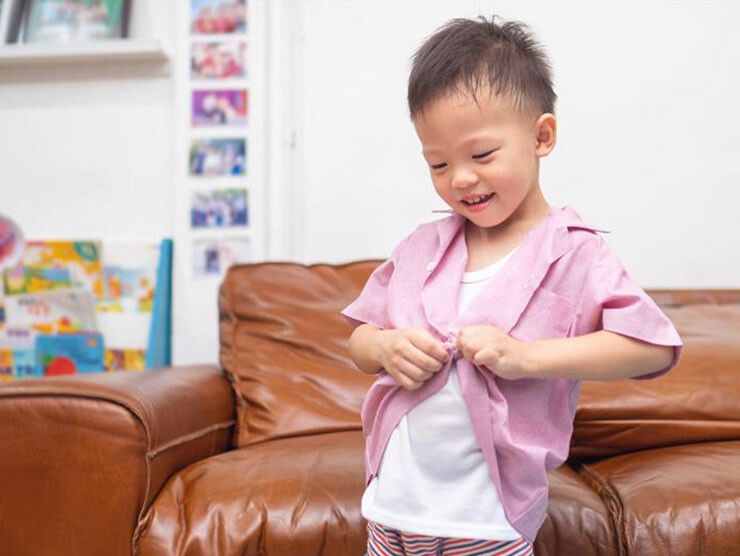Kindergarten readiness goes beyond knowing the alphabet or counting to ten. It includes a blend of social, emotional, language, cognitive, and physical skills that support a child's ability to thrive in school. Every child develops at their own pace, so readiness is about progress, not perfection.
Understanding the various kindergarten readiness helps parents support their child's development and build confidence as they approach this new chapter.
Your complete kindergarten readiness checklist
At Bright Horizons, we believe that early learning experiences should prioritize the joy of childhood, nurture each individual child, foster a love of learning, and build a strong foundation for all that comes next.
Every child develops at their own pace, but there are key skills that can help ensure a smoother transition into kindergarten. This checklist provides examples of some of the skills your child might need across five different key areas.
- Social and emotional skills:
— With support, understands and manages emotions and behaviors
— Understands sharing, taking turns, and cooperating with others
— Engage with and has fun with peers and friends
— Adapts, learns from mistakes, and keeps trying after a setback
- Language and communication skills:
— Understands and follows simple instructions
— Communicates, listens, and expresses themselves
— Shows curiosity, eagerness to explore new ideas, and creative problem-solving
- Cognitive and pre-academic skills:
— Recognizes many letters and shapes
— Understands basic patterns, sequencing, and sorting
— Shows curiosity, eagerness to explore new ideas, and creative problem-solving
- Physical and motor development:
— Fine motor skills (small finger and hand muscle movements): Holds a pencil or crayon and can make marks, build a block tower, uses tools like scissors appropriately
— Gross motor skills (large arm and leg muscle movements): Can jump, run, and throw a ball
- Practical life skills and independence:
— Dresses and uses the bathroom independently
— Follows daily routines
— Feeds and cleans up after themselves
In Bright Horizons classrooms, educators intentionally support children's developing autonomy to foster perseverance, resilience, and confidence. This focus on the whole-child development and future-ready skills shapes the curriculum, teaching practices, and learning environment within the Discovery Driven Learning framework.
Tips to prepare your child for a smooth kindergarten start
- Protect play: Encourage play at home with activities like puzzles, blocks, playing pretend, and outdoor play to help your child build problem-solving skills and creativity. Limit the use of ‘school readiness’ worksheets, software, and apps—they often prioritize memorization and can take away from more authentic learning.
- Establish routines early: Setting consistent bedtime and morning routines a few weeks before school starts can help children transition into school easier. Predictable schedules help children feel secure and ready to learn.
- Ease separation anxiety: Practice short goodbyes with trusted friends or family. You can create a goodbye routine to reassure your child and help them feel more comfortable when it’s time to say goodbye at school.
- Build early literacy and math skills: Incorporate early learning into daily life by counting snacks, sorting play objects, or naming letters on cereal boxes. These simple yet fun activities support skills that will be used at school.
- Foster social confidence: Plan playdates or take your child to the park for social interaction with other children in order to help with learning how to share, take turns, and build relationships.
- Read together: Reading to your child builds vocabulary, listening skills, and a love of reading. Let your child choose the books to read to keep it fun and engaging.
- Encourage independence: Teach your child to contribute to small tasks like packing their bags, dressing themselves, or helping clean the table. These skills boost confidence and readiness.
- Encourage healthy risks: Taking risks in a safe environment builds confidence and teaches valuable life success skills. These moments can also help you build a stronger relationship with your child. When giving them independence to a certain level, it sends the message, “I trust you”.
- Keep it simple: Don’t forget that you, the family, are the most essential ingredient for school readiness. No tablet apps, worksheets, or instructive lessons are needed — just meaningful moments wherever they fit into your family life.
With a little preparation and lots of encouragement, your child will be ready to take on kindergarten and all the year of school beyond with confidence and joy.
At Bright Horizons, our early learning programs prioritizes the joy of childhood, nurture each individual child, foster a love of learning, and build a strong foundation for all that comes next.
Learn more about our kindergarten programs and how we can support your family during this new journey.



.ashx?as=1)
.ashx?as=1)